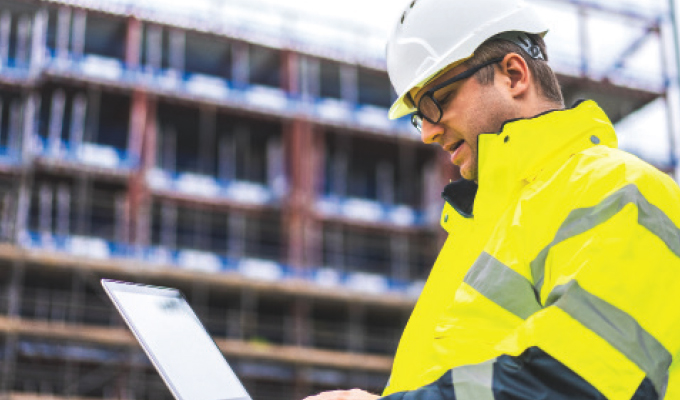By Martin Holmgren
While the recent COVID-19 pandemic brought an increased interest in remote monitoring solutions, this has been an issue in the construction industry for some time. Whether working from home or in a remote location, the ability to see and manage a jobsite from afar is challenging without the right tools and technology. With reduced workforces and the pressures of increased compliance, security, and health and safety practices, contractors are looking for ways to improve their processes. As companies forge ahead under new processes and guidelines, automating repetitive tasks such as reporting, headcounts, and access control can reduce the amount of time contractors have to physically be on a jobsite.
WORKFORCE MANAGEMENT
Knowing which workers, contractors, or trades are on the site at any given time, how much work is being done, and how it aligns with committed volumes on a labor schedule is key to making decisions that will keep projects on track and profitable.
Real-time data can be collected remotely and used for high-level decision-making, such as evaluating risks to current commitments, or at a more granular level, being notified the moment the electrical foreman arrives on the site. This can be accomplished by deploying a construction-specific access control system, which allows the project team to monitor the flow of traffic in, out, and even around the worksite.
For a more contextual view of the project, live video from the worksite is becoming more common as well. Live-streamed video from the worksite gives project managers the ability to monitor activity and progress for reporting and even spot safety checks. The recent months of social distancing has brought some useful lessons. Even when site visits become easier to organize, it’s likely that one lesson to be learned is that time spent traveling to jobsites is expensive. The ability to limit in-person visits could easily cover the cost of improved remote monitoring.
COMPLIANCE AUTOMATION
Ensuring that workers are authorized for the area they’re entering is critical for jobsite safety. Without proper access tracking, workers risk unintentionally entering an area that poses any number of health threats. Chemical exposure, hearing damage, head injuries or worse can occur when a worker enters an area without the correct safety equipment. Using technology to manage access allows companies to more easily monitor who is entering and leaving the jobsite, and to secure access to only workers who are authorized to be there. It also allows for customized entry to a jobsite based on criteria such as signed NDAs, passed drug tests, background screens, and current licenses.
Additionally, if there is an emergency or weather event and everyone on the site needs to be alerted immediately, a message can be broadcast to all on-site workers at that same time. Once they all reach the muster point, supervisors on site can also use the same system to do immediate and contactless roll calls of everyone there. By using their mobile phones or other handheld devices, they can almost instantaneously know who isn’t at the muster and who may still be in danger.
Matt Ogle, senior safety manager at JE Dunn Construction, recently experienced firsthand the value of this type of technology. “We’ve found Trimble CrewSight to be a great value to help us communicate to our onsite workforce, using the text message system to alert our team of weather conditions. We recently tracked a storm and when lightning was less than our working parameter, we used the CrewSight system text to alert all workers to stop all outdoor activities. Once the lightning passed, we sent another text to tell everyone it was safe,” says Ogle.
SOCIAL DISTANCING
In today’s environment of extended health and safety checks, there are four core actions that need to happen when workers enter a construction site: collection of time and attendance data, social distancing, compliance and health and well-being checks, and reduction of shared surface contact.
To handle this, contractors need to deploy a solution that can hold all worker data on compliance questions, checks, and documentation, read a worker’s identification from 6 feet away, populate their remote site monitoring system, and manage access to a construction site without having to touch a common surface.
This sounds difficult, but technology is helping ease the burden of managing these requirements on sites across the country today. With many contractors having to run sites remotely, they need to be able to access live data, including how many people are on site, and use this information to compare schedules and ensure that projects keep moving forward as planned.
Contractor’s also need to keep security guards and workers safe by maintaining a robust social distancing practice on the site. This means that whatever system they use to capture worker attendance needs to be able to work from a safe distance. This can be done by equipping the jobsite security with handheld devices which can read worker ID badges at a distance as workers come and go from the site.
While on-site management and visits will always be critical in the construction industry, integrating the right remote monitoring technology can help contractors more effectively and safely manage their projects when they are not able to be there in person. This can help contractors run their jobsites—and their business—more efficiently both during a pandemic and well into the future.
About the author:
Martin Holmgren is general manager, buildings field solutions, at Trimble Inc. For more, visit fieldtech.trimble.com.
Modern Contractor Solutions, July 2020
Did you enjoy this article?
Subscribe to the FREE Digital Edition of Modern Contractor Solutions magazine.



